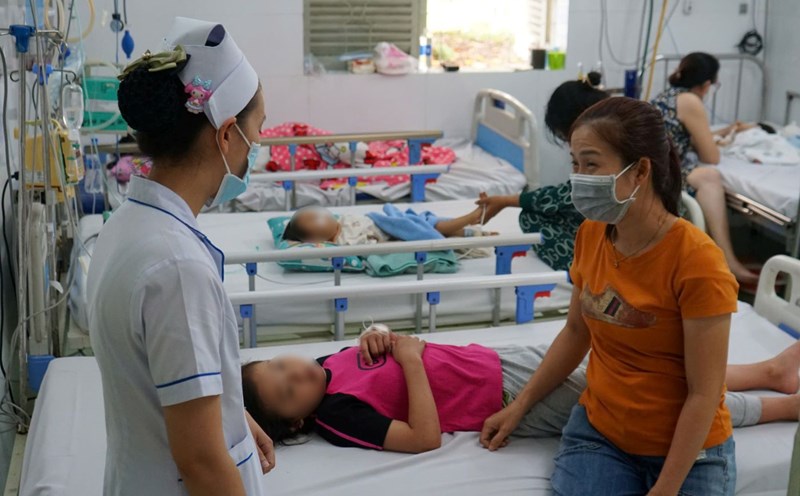On April 20, the City Children's Hospital said that the unit was treating female patient C.T (9 years old, Ben Tre province) with a diagnosis of severe dengue shock on the 4th day, blood clotting disorder, digestive hemorrhage, liver damage, and severe respiratory failure.
Medical history shows that the child had high fever for 3 consecutive days. By the 4th day of the disease, the child had a stomachache, vomited brown pig disease, cold hands and feet. The family took the child to a local hospital.
Here, there was a mild condition of pulse, cool limbs, blood pressure dropped to 70 50% mmHg, and was diagnosed with severe dengue shock on day 4 of active treatment with anti-shock fluids according to the protocol. After that, the child's condition became serious and he was transferred to the City Children's Hospital.
The patient was continued to be given high IV fluids, anti-shock with the support of invasive arterial blood pressure measuring devices, central varicose pressure measurement, and bladder pressure measurement. At the same time, they used combined vasopressors.
The child was supported with respiratory support with continuous positive pressure, non-invasive mechanical ventilation. After that, the child was placed in the endotracheal tube to breathe a ventilator early, and a pathologist to drain the abdominal dishes to relieve pressure.
The child was given blood, fresh frozen huyet tuong, thickened platelets, vitamin K1 and treatment to support the liver. After nearly 2 weeks of treatment, the child gradually recovered, was taken off the ventilator, and was alert. liver and kidney function returns to normal.
Through this case, Dr. Nguyen Minh Tien - Deputy Director of the City Children's Hospital recommended that currently, dengue fever still affects children as well as adults. Parents need to pay attention to implementing disease prevention measures such as killing mosquitoes, mosquito larvae, sleeping on the stomach...
It is necessary to take children to the hospital immediately when they have a high fever for more than 2 days; cracked, wheezing or lethargy, lethargy, slurred speech; bleeding, bleeding or vomiting, black stools; abdominal pain, vomiting; cold hands and feet; sluggishness, lying in one place without playing or stopping feeding, stopping eating.
The Ho Chi Minh City health sector has increased monitoring, investigation and handling of dengue fever and outbreak cases, while strictly controlling high-risk points. Local health units are directed to thoroughly handle risk areas.
The Ho Chi Minh City Center for Disease Control calls on people to proactively prevent epidemics, remove water containers, environmental sanitation, and prevent mosquito bites. People can report risk points through the online Health application for timely handling.











